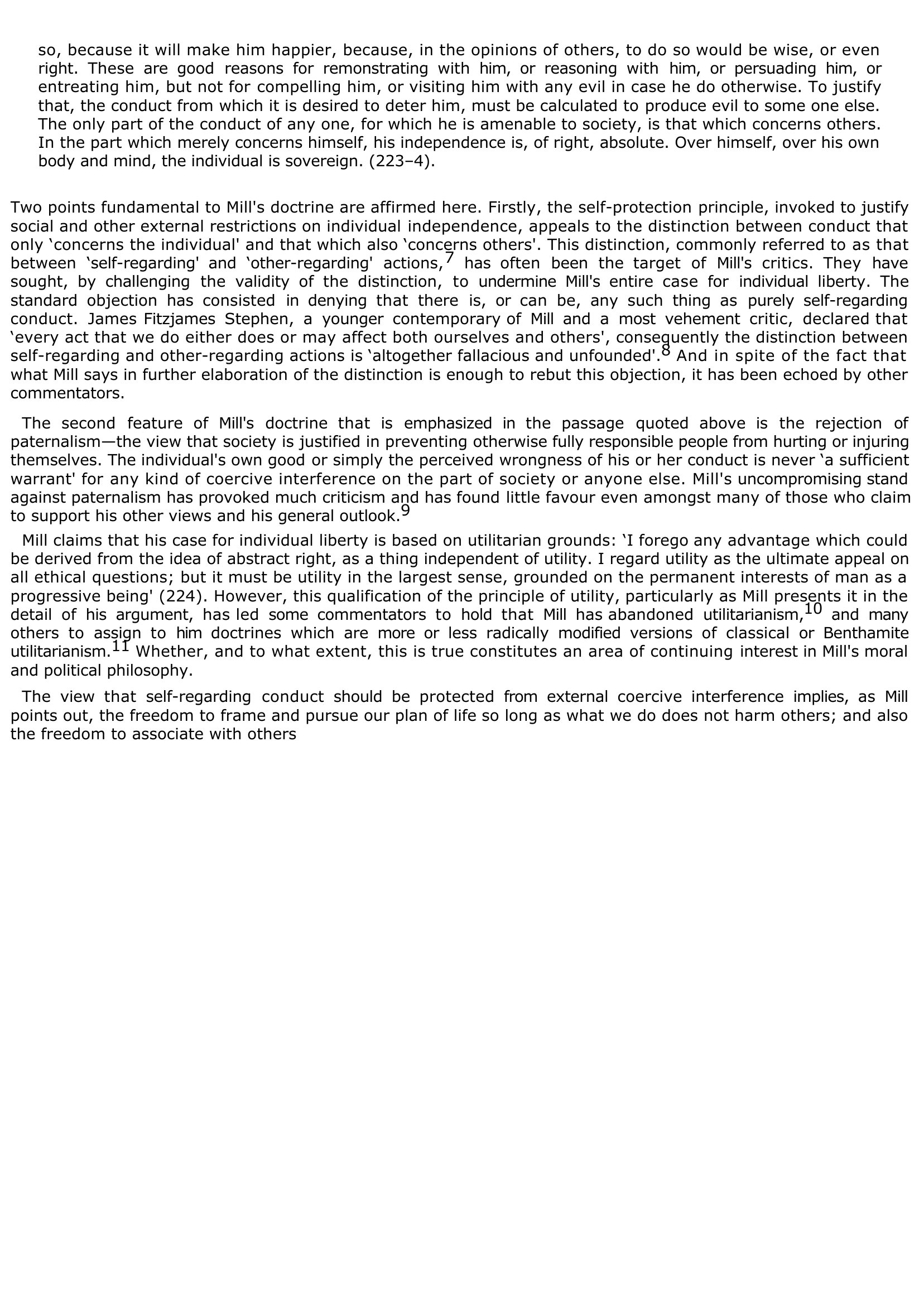Encyclopedia of Philosophy: J.S.Mill
Publié le 09/01/2010

Extrait du document
John Stuart Mill’s mature views on ethics and politics are to be found in On Liberty (published in 1859), Utilitarianism (1861), Considerations on Representative Government (1861) and The Subjection of Women (written in 1861–2 but published in 1869). Of these, Liberty is the centrepiece, detailing the doctrines and themes which govern most of the discussion in the other works. It is also the work by which Mill will be most remembered. He himself picked it out as ‘likely to survive longer than anything else’ that he had written. It has aroused more controversy than any other of his writings, and the essay On Liberty has been taken by many of Mill’s critics as well as his supporters to be the most distinctive if not authoritative statement of the liberal position.
«
so, because it will make him happier, because, in the opinions of others, to do so would be wise, or even right.
These are good reasons for remonstrating with him, or reasoning with him, or persuading him, or entreating him, but not for compelling him, or visiting him with any evil in case he do otherwise.
To justify that, the conduct from which it is desired to deter him, must be calculated to produce evil to some one else. The only part of the conduct of any one, for which he is amenable to society, is that which concerns others. In the part which merely concerns himself, his independence is, of right, absolute.
Over himself, over his own body and mind, the individual is sovereign.
(223–4).
Two points fundamental to Mill's doctrine are affirmed here.
Firstly, the self-protection principle, invoked to justify social and other external restrictions on individual independence, appeals to the distinction between conduct that only ‘concerns the individual' and that which also ‘concerns others'.
This distinction, commonly referred to as that between ‘self-regarding' and ‘other-regarding' actions, 7 has often been the target of Mill's critics.
They have sought, by challenging the validity of the distinction, to undermine Mill's entire case for individual liberty.
Thestandard objection has consisted in denying that there is, or can be, any such thing as purely self-regarding conduct.
James Fitzjames Stephen, a younger contemporary of Mill and a most vehement critic, declared that ‘every act that we do either does or may affect both ourselves and others', consequently the distinction between self-regarding and other-regarding actions is ‘altogether fallacious and unfounded'. 8 And in spite of the fact that what Mill says in further elaboration of the distinction is enough to rebut this objection, it has been echoed by other commentators.
The second feature of Mill's doctrine that is emphasized in the passage quoted above is the rejection of paternalism—the view that society is justified in preventing otherwise fully responsible people from hurting or injuring themselves.
The individual's own good or simply the perceived wrongness of his or her conduct is never ‘a sufficient warrant' for any kind of coercive interference on the part of society or anyone else.
Mill's uncompromising stand against paternalism has provoked much criticism and has found little favour even amongst many of those who claim to support his other views and his general outlook. 9
Mill claims that his case for individual liberty is based on utilitarian grounds: ‘I forego any advantage which could be derived from the idea of abstract right, as a thing independent of utility.
I regard utility as the ultimate appeal on all ethical questions; but it must be utility in the largest sense, grounded on the permanent interests of man as a progressive being' (224).
However, this qualification of the principle of utility, particularly as Mill presents it in the detail of his argument, has led some commentators to hold that Mill has abandoned utilitarianism, 10 and many others to assign to him doctrines which are more or less radically modified versions of classical or Benthamite utilitarianism. 11 Whether, and to what extent, this is true constitutes an area of continuing interest in Mill's moral and political philosophy.
The view that self-regarding conduct should be protected from external coercive interference implies, as Mill points out, the freedom to frame and pursue our plan of life so long as what we do does not harm others; and also the freedom to associate with others.
»
↓↓↓ APERÇU DU DOCUMENT ↓↓↓
Liens utiles
- Encyclopedia of Philosophy: Bentham and James Mill
- Encyclopedia of Philosophy: al-Ghazali, Abu Hamid
- Encyclopedia of Philosophy: al-Farabi, Abu Nasr
- Encyclopedia of Philosophy: Alexander, Samuel
- Encyclopedia of Philosophy: Alexander of Hales

































